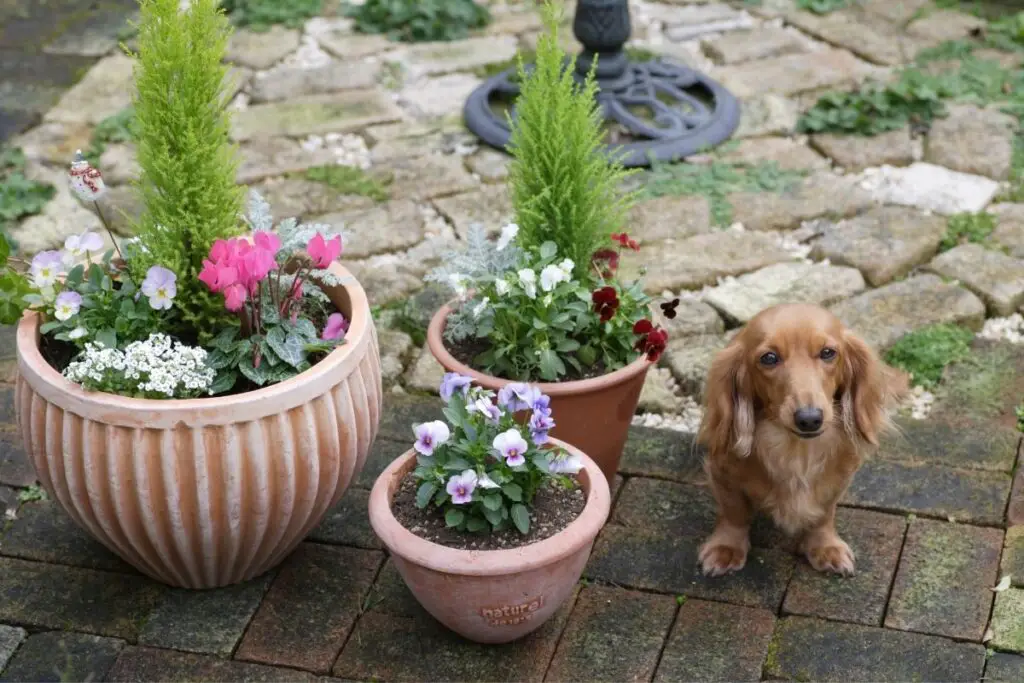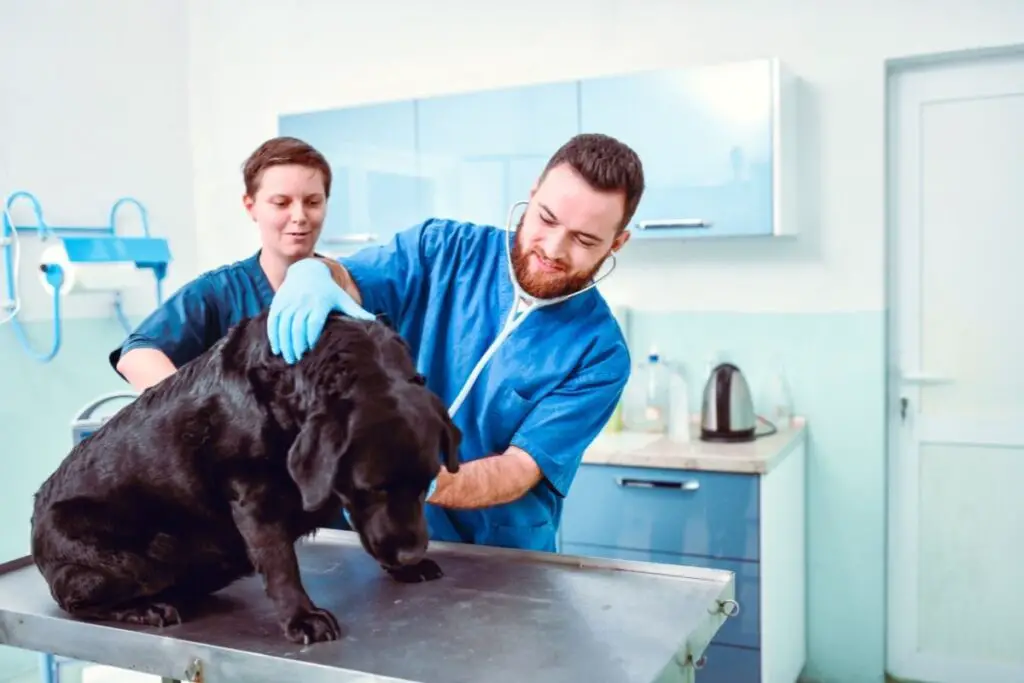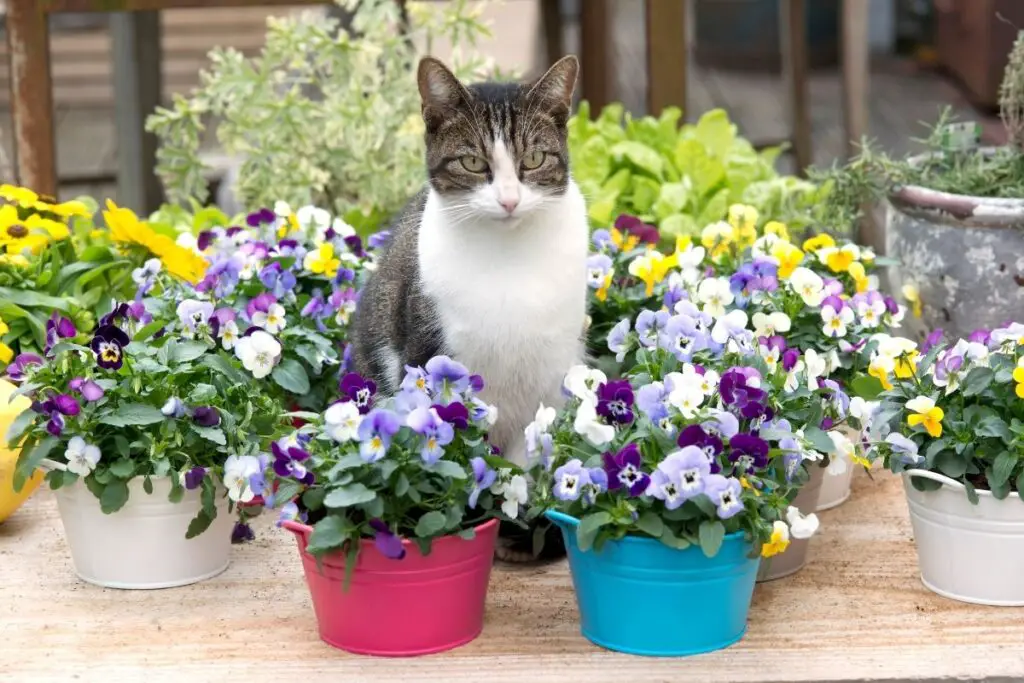Pansies are outdoor garden plants with beautiful flowers. The flower petals of pansies are edible and highly decorative. The aroma of pansies might attract pets, which might be dangerous for them to a certain level.
Pansies are not considered poisonous, but they have some toxicity that is not very safe for pets. This potential toxicity can happen because of improper use of plants or when their consumption is higher.
A common question that comes to everyone’s mind is are pansies poisonous to pets?
Pansies are safe to plant around your pets, as long as your pet doesn’t end up eating a big chunk of the plant. A substance known as Saponins(violin) is found in pansies, which can cause minor health issues like vomiting, diarrhea, and other allergic reactions, but mostly pansy is safe for pets.
Some common symptoms in pets, such as vomiting and diarrhea’s indicate your pets have eaten the pansy plants in large quantities or over a long period.
You can safely plant pansies in your garden but be a little careful, make sure to keep your pets away from pansies.
This article will clear your doubts regarding the toxicity of pansies and how to keep your pets away from pansies.
We will also discuss how harmful pansies can be for your pet and the safety measures that must be taken to protect your pets from them.

Are pansies pet-friendly?
Pansies are pet-safe and hardy garden plants. They are edible plants, and pansies toxicity level is very mild compared to other garden plants. They are not much harmful to pets such as cats and dogs.
However, you need to be a little cautious as pansies can cause some health problems if consumed in a large amount. The wintergreen flavor of pansies may attract your pets.
Eating these plants in higher amounts can cause indigestion to your pets. Pansies are not included in their regular diet, so this can adversely affect your pet’s health.
They can suffer from problems like stomach aches, vomiting, diarrhea, dermatitis, and skin irritation. Pansies are rich in mucilage and bitter principles (Saponins) that may prove to be harmful to your pets.
Mucilage is a thick, gluey substance produced by pansies. Mucilage contains intestinal parasites and amoeba species that may enter your pet’s stomach while eating.
Similarly, Saponins are natural plant toxins found in pansies cells that can affect your pet’s digestive system and cause diarrhea, vomiting, cramping, and pain.
The best way of protecting your pets is to keep them away from pansies. You should be careful while choosing the spot for planting pansies. The spot in your garden should be away from the reach of your pets.
How poisonous are pansies?
Pansies are slightly toxic, but they don’t have many adverse effects.
Pansies are composed of substances like Saponins, mucilage, and tannins, which are slightly toxic.
Small consumption of pansies will never harm your pets. But a large consumption can be the reason for your pet’s sickness. You may notice some symptoms in your pets if they ate pansies.
They might be suffering from vomiting, diarrhea, or drooling. Also, you should check the plants to make sure that your pets have taken bites from the pansies and not some other plants.
You may have many plants in your garden, but if you notice that a considerable chunk of your pansy plant is missing, then you must take some quick steps to protect your pets from any severe damage.
You must contact the vet immediately to overcome this situation. There are four classes of toxicity, and pansies fall under class two levels of toxicity.
This means that pansies are low in toxicity. You can take care of your pets as pansies are less toxic plants.
Pet poisoning symptoms

The seeds and flowers of pansies are considered lightly toxic for your pets. If your pet is sick and is experiencing some irritation in its mouth and feeling thirsty, then it might have eaten your pansies.
These common signs are indications that your pet needs some attention and medical care.
Some common pet poisoning symptoms are :
- Vomiting
- Diarrhea
- Dermatitis
- Drooling
- Pale gums
- Appetite loss
- Excessive urination
Looking for gardening supplies? We have tested 100's of products before recommending them to you guys. Check out our best pick below:
| Image | Gardening Supplies | Best Price? |
|---|---|---|
 Top
Top Top
Top | Raised Garden Bed Kit | Check On Amazon |
 | XLUX Soil Moisture Meter, Plant Water Monitor, Soil Hygrometer Sensor for Gardening, Farming, Indoor and Outdoor Plants, No Batteries Required | No Results |
 Top
Top Top
Top | 82 Pcs Garden Tools Set and Extra Succulent Tools Set | Check On Amazon |
 | Joeys Garden Expandable Garden Hose with 8 Function Hose Nozzle, Lightweight Anti-Kink Flexible Garden Hoses, Extra Strength Fabric with Double Latex Core, (50 FT, Black) | No Results |
 Top
Top Top
Top | Dual Chamber Compost Tumbler | Check On Amazon |
 Top
Top Top
Top | Sunnyglade Plant Stakes | Check On Amazon |
 Top
Top Top
Top | Organic Cold Pressed Neem Seed Oil | Check On Amazon |
 Top
Top Top
Top | Mighty Mint Gallon :-Insect and Pest Control Peppermint Oil | Check On Amazon |
 Top
Top Top
Top | Scotts DiseaseEx Lawn Fungicide | Check On Amazon |
 Top
Top Top
Top | Jacks Classic 20-20-20 All Purpose Fertilizer | Check On Amazon |
 Top
Top Top
Top | 30,000 Seeds Pollinator Attracting Wildflower Mixture | Check On Amazon |
 Top
Top Top
Top | Survival Vegetable Seeds Garden Kit-Over 16,000 Seeds | Check On Amazon |
Which pets are vulnerable to pansies poisoning?
Pansies can be harmful to all kinds of pets if consumed in large quantities. However, some animals love to eat pansies like rabbits, squirrels, and deer. But some pets are vulnerable to pansies poisoning.
Some pets are notorious for getting their snouts into things they shouldn’t. They happily snuffle and touch up anything they come across, from a new toy in your home to a newly planted pansy plant.
Pets are curious and excited to explore the different kinds of plants and flowers in your garden.
Pets such as dogs and cats may face some kind of health problems after consuming pansies.
Insects and bugs that feed on them secrete a clear sticky liquid called honeydew that makes pansies sticky. This stick material may irritate your pet’s mouth and can cause ingestion to them. Hence, it becomes crucial to keep your pets away from pansies.
Are pansies toxic to dogs?
Dogs are notorious for anything edible for them. Dog eating pansies is a common problem during the spring season.
Pansies are mildly poisonous to their health but not enough to cause serious illness. Dogs might start eating pansies because of their fresh lettuce-like flavor.
Pansies contain naturally occurring compounds such as Saponins that will cause ingestion and can result in gastric upset.
Mucilage can irritate and swell in the mouth. And tannic acid found in pansies might cause vomiting, diarrhea, and abdominal pain.
If your dog consumes pansies in large amounts, it can lead to many symptoms. The signs are given below.
- Vomiting
- Diarrhea
- Swelling and mouth irritation
- Drooling
- Weakness
- Stomach ache
- Abdominal pain
Methods to keep your dogs away from pansies
- Plant your pansies in an area where your dog will not be able to reach them.
- To keep your dogs away from pansies, you can add some thorny branches in the ground at regular intervals.
- You can spray your pansies with white vinegar or apple bitter.
- Sprinkle red pepper flakes or powdered mustard around your plants.
- You can also plant marigolds between your pansies.
Are pansies toxic to cats?

Cats are pretty picky with their food, but sometimes you can find them smelling and tasting plants. The beautiful colors of pansies may attract your cat. Pansies, especially the seeds, are mildly toxic to cats.
It would be best never to plant the pansies near your cat’s living area. If your cat ingests pansies, then it may not poison them, but consuming pansies can have some side effects on your cat.
Contact with pansies, particularly their leaves, will cause dermatitis. This will irritate your cat and make it quite uncomfortable.
If you find that your cat is acting strange, you must quickly take her to any animal clinic immediately to be examined. Ensure that you are in consultation with a qualified vet.
If your cat consumes pansies, it may cause specific symptoms. The signs are given below:
- Diarrhea
- Vomiting
- Drooling
- Abnormal behavior
- Itching or blisters in mouth or gum
- Increase in heart rate
- Excessive urination and thirst
Methods to keep your cats away from pansies
- Use cat repellants in your garden. Spray or drop these repellants near your pansies, and the cats would not go there.
- You can use cayenne pepper, which has capsaicin, which is quite a terror to cats. Cats have a good sense of smell, and they can easily catch the pepper’s whiff and thus will stay away from pansies.
- You can also use tea leaves by dropping them around your pansies’ leaves, and you will find that your cat will not go there.
- You can spread a layer of coffee grounds in the soil to keep your cat away.
- You can even spread peels of citrus fruits directly in the garden soil to keep them away from pansies.
Are pansies dangerous to rabbits and other small animals?
Pansies are not harmful to rabbits as their body is adopted for consuming such flowers and foliage. Rabbits are those animals that love feeding on pansies. Pansies are one of the favorite delicacies for these animals in the fall.
Pansies are rich in nutrition and a tasty source of food for them. Rabbits can eat all the parts of your pansies as it is non-toxic for them.
If you have small pets like guinea pigs, squirrels, or fancy rats, you should not worry about eating your pansies. These creatures suffer no harm after eating pansies.
Once they get the taste of these plants, they tend to revisit them again and again. But still, you should make sure that keep your tiny pets away from your pansies, as this will harm your plants’ healthy growth.
What to do if your pet ate pansies?
Pets don’t know which food is good for them and which can harm them. The pet owner’s responsibility should be to take care of their needs and check their eating habits.
If you know that your pet has consumed pansies, you must take professional advice from the vet’s clinic. You must tell every symptom or problem that your pet is experiencing after consuming pansies.
You must make sure that your pet is breathing and behaving normally. If you find any strange change in their habits, immediately place a call to your nearest vet.
You should never take this situation lightly. A professional can tell whether you need to treat your pet at home or bring them to the hospital. The faster you get help for your pet who’s eaten pansies, the better are the chances of your pet recovering from the poisoning.
The treatment of your pet at home or in a veterinary hospital will be specific to the plant that poisoned your pet. The doctor will try to discover the effects of the plant substance in your pet’s stomach, and he will do the treatment accordingly.
Final words
Pansies are mildly toxic plants for your pets, such as dogs and cats. They may attract pets because of their attractive texture and taste.
Pansies are not harmful to all kinds of pets. Some pets like rabbits, squirrels, or rats love to eat pansies. In contrast, it may be a little harmful to pets like cats and dogs.
Saponins and mucilage are the most toxic substances found in pansies.
Small consumption of pansies may not harm your pets, but prolonged consumption can cause poor health to them.
In dogs and cats, you may find specific symptoms such as vomiting, drooling, digestion, and mouth irritation. You must contact your nearest vet if you find that your pet is facing some problem or irritation.
However, it is always better to keep your pet away from these plants for their safety.
Source: Ornamentals toxic plants, Pet poison online, Toxic plants, and companion animals, Safe And Unsafe Plants For Your Hamsters, Safe And Unsafe Plants For Your Hedgehog.
